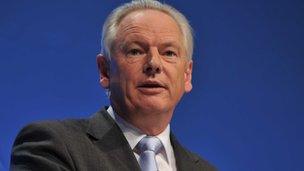Move 'lazy' civil servants, says Sir Jeremy Heywood
- Published

Francis Maude says he is frustrated by the pace of change in the civil service
Some civil servants are "lazy" and need to be moved from their jobs, Britain's top civil servant has said.
Cabinet Secretary Sir Jeremy Heywood was defending a scheme in which the bottom 10% of staff are targeted for improvement or moved out.
He also backed allowing ministers to "hand-pick" staff in their private office and limit permanent secretaries to five-year terms.
Unions have called the plans "blatant politicisation" of the civil service.
Sir Jeremy said suggestions top civil servants were opposed to a major revamp of the way the civil service operates, launched last year, were "wide of the mark".
Under the scheme, the top 25% performers in each government department are rewarded - some with cash bonuses - and the bottom 10% identified for action to improve their performance or be moved out.
'Churn'
No figures were available for the numbers who left their posts, but Sir Jeremy said there had been a willingness to implement the scheme, as "nothing annoys good civil servants more than seeing lazy civil servants going year after year without addressing that performance problem".
The government is frustrated with the pace of change in the civil service since the reforms were launched last year.
Cabinet Office Minister Francis Maude now wants further changes to ensure ministers - rather than civil servants - call the shots in their departments.
Under Mr Maude's plans, ministers' private offices would be bigger and officials, including policy experts brought in from outside the civil service, would be personally appointed by and report to the secretary of state.
Some Whitehall staff would also report directly to ministers rather than other civil servants.
The most senior officials in each department - the permanent secretaries - would be appointed on five-year "fixed-tenure appointments".
The aim is to reduce the "churn" that has recently seen top civil servants stay in their posts for less than four years.
The five-year terms will not be timed to coincide with general elections, in order to maintain the principle that impartial civil servants can serve governments of any party. There is no indication how big the expanded private offices should be.
'Accountable'
Mr Maude insisted the UK would not go down the American route, where new administrations bring in their own people, but he said there was a problem with senior civil servants sidelining ministers.
"You don't want to have a sense, which some ministers have mentioned to me, that sometimes it feels like the department's office is being lent to the minister," he told the BBC News channel.
"It needs to feel like what should be the reality, that it's the minister's office, directly accountable to the minister."
But Dave Penman, general secretary of senior public officials union the FDA, which represents about 18,000 civil servants, warned about politicisation of the civil service.
"The danger is that ministerial offices staffed by personal appointees will ultimately be loyal to their minister, not the taxpayer," said Mr Penman.
"Support in this context is likely to mean ministers hear what they want to hear, but not what they need to hear.
"The destabilising effect of this approach should not be underestimated - the last thing anyone needs is further turmoil through the ranks of the civil service every time there is a reshuffle or election."
The Institute for Government think tank said a long-serving senior civil servant should be put in charge of the larger ministerial private offices to prevent politicisation.
IFG director Peter Riddell said: "An expanded private office headed by a politically appointed chief of staff risks becoming an alternative power base within the department and could disengage the minister from their department."
- Published28 February 2013
- Published16 January 2013
- Published3 July 2012